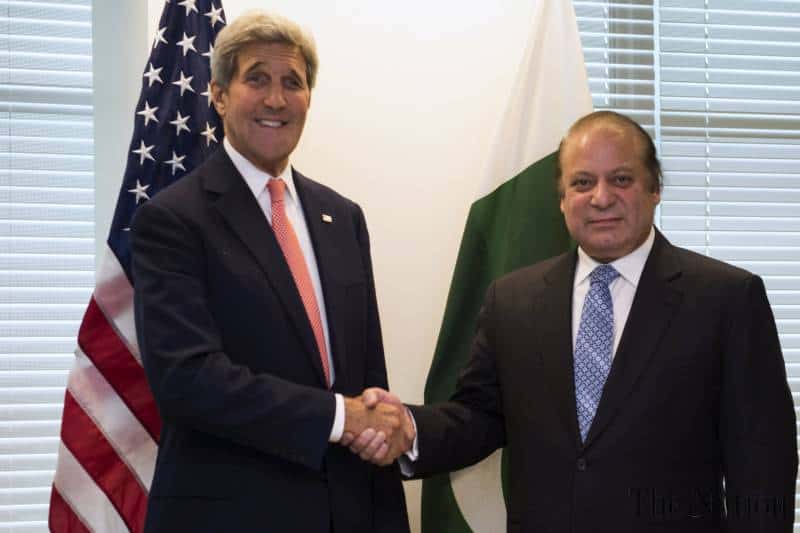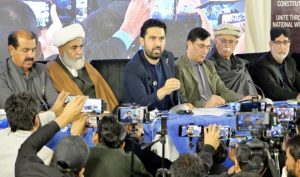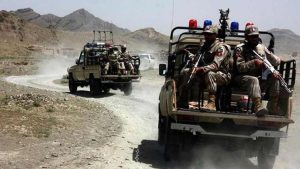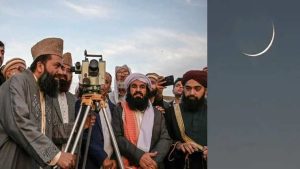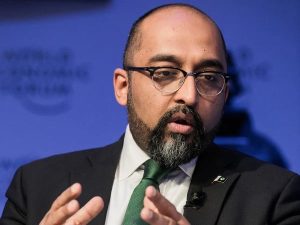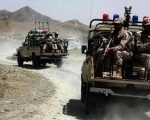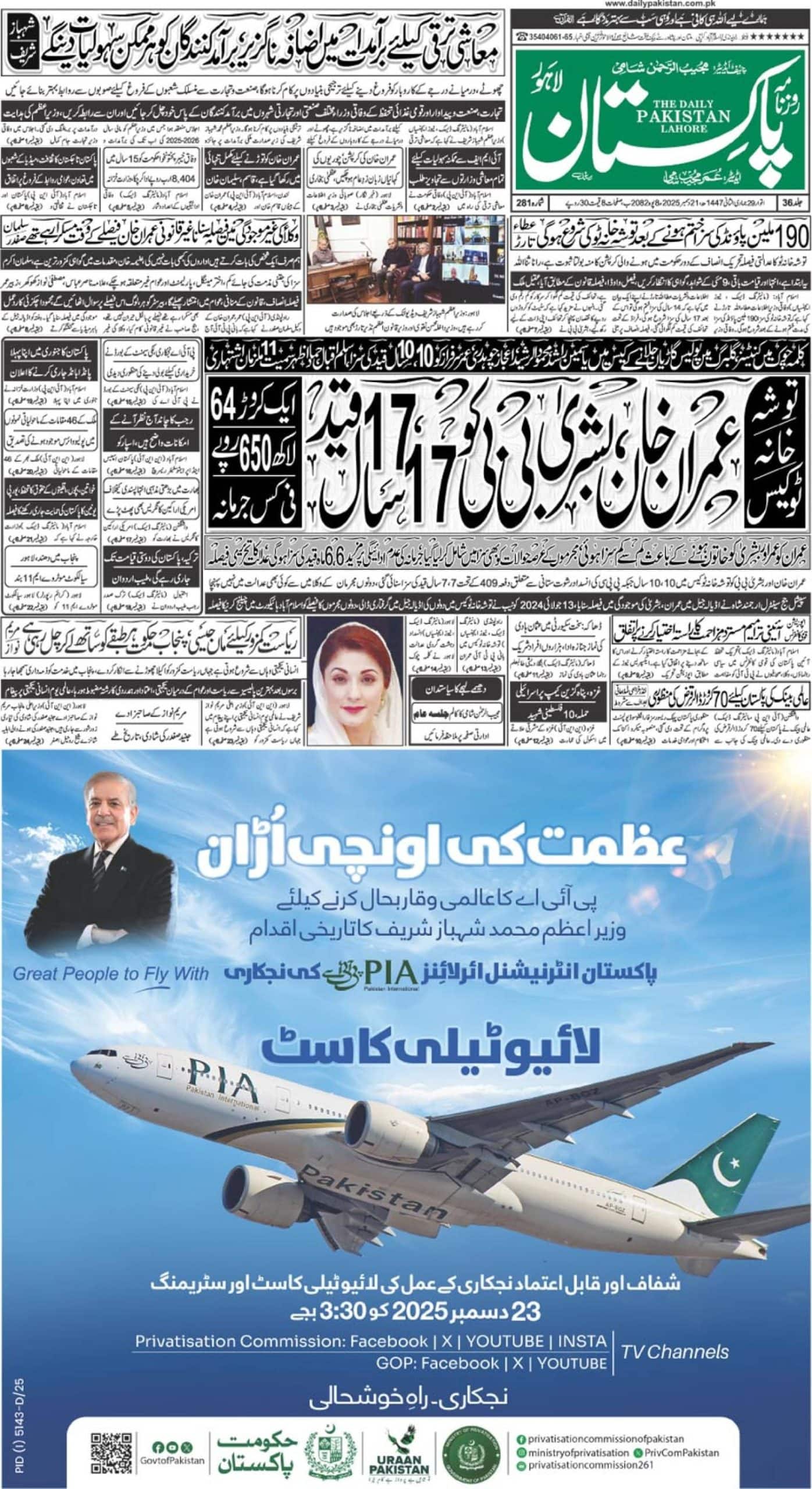WASHINGTON (Web Desk) – Pakistan and the United States Thursday emphasized the importance of a sustained and resilient dialogue process between Pakistan and India aimed at resolving all outstanding territorial and other disputes, including Kashmir, through peaceful means.
According to a joint statement issued after the bilateral meeting between Prime Minister Muhammad Nawaz Sharif and US President Barack Obama, the two sides expressed their concern over violence along the Line of Control.
They noted their support for confidence-building measures and effective mechanisms that are acceptable to both parties.
President Obama and Prime Minister Sharif stressed that improvement in Pakistan-India bilateral relations would greatly enhance prospects for lasting peace, stability, and prosperity in the region.
According to the joint statement, President Obama and Prime Minister Nawaz Sharif emphasized the value of investing in higher and basic education. Reflecting this, the United States and Pakistan re- instituted an Education, Science and Technology Working Group under the bilateral Strategic Dialogue, and in June, launched three University Centers for Advanced Studies in agriculture, energy, and water research.
The joint statement said this is in addition to 19 existing university partnerships between U.S. and Pakistani institutions and the highest-funded Fulbright scholarship program in the world.
Welcoming the establishment of the “U.S.-Pakistan Knowledge Corridor” in June 2015, the two leaders directed their respective governments to intensify cooperation within this important framework in consonance with the priorities set out in Pakistan’s Vision 2025. In the near term, the two governments intend to double joint funding for a new round of research grants under the U.S.-Pakistan Science and Technology Cooperation Agreement.
Building on important cooperation in basic education to date, the Leaders welcomed the launch of the Let Girls Learn Initiative in Pakistan, a global effort led by the United States, which will provide 200,000 Pakistani girls access to education and the tools they need to succeed in life.
According to the statement, the President commended Prime Minister Sharif’s commitment to education as a priority, demonstrated through the doubling of Pakistan’s higher education budget since 2013 and the government’s goal of doubling expenditures for education from two percent to four percent of gross domestic product by 2018.
The leaders recognized the importance of civil society to the fundamental health and stability of all democratic societies. International nongovernmental organizations (INGOs) and civil society groups can contribute toward the promotion of Pakistan’s national development goals and can complement the work of the government to address the needs of the underprivileged populations, promote human rights, and strengthen democratic governance.
The Prime Minister mentioned that recently issued policy guidelines were intended by the Government of Pakistan to facilitate the functioning of INGOs, and further stated that these guidelines will be reviewed and implemented in consultation with all stakeholders. The President noted that policy guidelines governing INGOs should be transparent and consistent with international norms so as to facilitate the important work of these organizations.
According to the statement, President Obama reaffirmed the U.S. commitment to strong cooperation in the energy sector.
The leaders announced the formation of a new U.S.-Pakistan Clean Energy Partnership, based on the initial work of the April 2015 Energy Working Group under the U.S.-Pakistan Strategic Dialogue. At its core, the Partnership aims to facilitate private sector investment in Pakistan’s energy sector, including generation, transmission, and distribution.
The statement said through the Partnership, the United States and Pakistan will cooperate to: attract local and international investment; develop an investment plan for expanding the role of clean energy systems; expand transmission capacity through selected infrastructure projects; and mobilize development financing to help attract private sector investments in hydropower, wind, solar, and natural gas projects.
The two leaders noted their cooperation in the development of Pakistan’s domestic oil and gas resources and liquefied natural gas sectors. President Obama expressed support for Pakistan’s efforts to secure funding for the Diamer Bhasha and Dasu dams to help meet Pakistan’s energy and water needs.
President Obama and Prime Minister Sharif expressed their commitment to press for an ambitious agreement on climate change at the Paris Climate Conference in December. The United States and Pakistan welcome the fact that the United States has communicated its Intended Nationally Determined Contribution (INDC) and that Pakistan stated its plan to soon submit its INDC.
The leaders underscored the importance of longer-range efforts to transition to low-carbon economies and of continued, robust financial support to help developing countries build low-carbon and climate-resilient societies.
Further, to advance global efforts to address a leading cause of climate change, President Obama and Prime Minister Sharif affirmed that their respective countries intend to work together to amend the Montreal Protocol this year to curb the production and consumption of hydrofluorocarbons.
Both sides stressed the importance of adaptation to the adverse impacts of climate change. As a country particularly vulnerable to the effects of climate change, Pakistan has suffered major floods, heat waves, and droughts in recent years. President Obama offered continued U.S. support to Pakistan to build infrastructure and organizational capacity to counter natural disasters and provide relief to the affected populations.
Taking note of the robust bilateral defense cooperation between their two countries, including recent military engagements, exercises, and consultations on regional security, President Obama and Prime Minister Sharif expressed satisfaction with the cooperation achieved in defense relations and reaffirmed that this partnership should endure.
According to the joint statement, Prime Minister Sharif conveyed appreciation for U.S. security assistance in support of Pakistan’s counter-terrorism, counter-insurgency, counter-narcotics, and maritime security operations and expressed hope of broadening bilateral defense cooperation in areas that serve the two countries’ mutual interest.
President Obama noted Pakistan’s positive efforts to counter improvised explosive devices (IEDs) and both leaders resolved to continue working together to disrupt the threat posed by these devices.
They recognized that a stable and peaceful Pakistan- Afghanistan border was important for the success of counterterrorism, counterinsurgency, and counter-IED efforts. They also underscored the critical significance of effective border coordination mechanisms between Pakistan and Afghanistan in achieving these objectives.
The two leaders reaffirmed that the defense consultative group mechanism has been critical in stimulating defense partnership and resolved to explore new avenues of enhancing defense collaboration.
Recognizing the opportunities and challenges presented by information and communications technologies, President Obama and Prime Minister Sharif affirmed that international cooperation is essential to make cyberspace secure and stable.
As per statement, both leaders endorsed the consensus report of the 2015 UN Group of Governmental Experts in the Field of Information and Telecommunications in the Context of International Security.
The leaders looked forward to further multilateral engagement, and discussion of cyber issues as part of the U.S.-Pakistan Strategic Dialogue.
President Obama and Prime Minister Sharif recognized the shared interest in strategic stability in South Asia. The two leaders underscored that all sides should continuously act with maximum restraint and work jointly toward strengthening strategic stability in South Asia.
They acknowledged the importance of regional balance and stability in South Asia and pursuing increased transparency and uninterrupted dialogue in support of peaceful resolution of all outstanding disputes.
President Obama and Prime Minister Nawaz Sharif discussed the continuing threat of nuclear terrorism. The United States and Pakistan committed to work together to make the Nuclear Security Summit hosted by President Obama next year a success.
President Obama welcomed Pakistan’s constructive engagement with the Nuclear Security Summit process and its cooperation with the International Atomic Energy Agency and other international forums.
The leaders noted Pakistan’s efforts to improve its strategic trade controls and enhance its engagement with multilateral export control regimes. Recognizing the importance of bilateral engagement in the Security, Strategic Stability and Non-Proliferation Working Group, the two leaders noted that both sides will continue to stay engaged to further build on the ongoing discussions in the working group.
The statement concluded that the two leaders affirmed their common resolve to continue working together to address the issues of greatest interest to both nations. Building on the foundation of the Enhanced Partnership for Pakistan Act, President Obama reiterated a commitment to comprehensive bilateral cooperation through both the public and private sectors, into the future.
The leaders committed to fostering a deeper, stronger, multi- dimensional partnership based on mutual respect, trust and understanding to cooperatively tackle the global challenges of the 21st century, it added.

